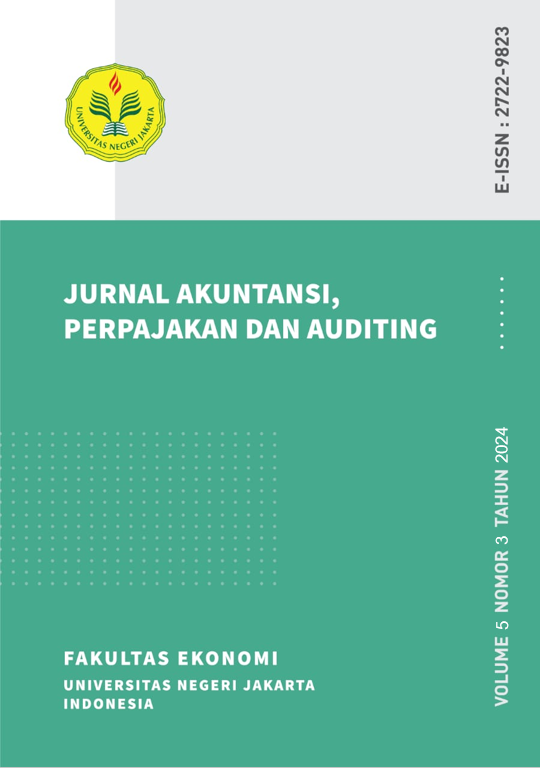Pengaruh Debt Default, Financial Distress, dan Auditor Switching Terhadap Penerimaan Opini Audit Going Concern
DOI:
https://doi.org/10.21009/japa.0503.03Keywords:
Debt Default, Financial Distress, Auditor Switching, Acceptance of Going Concern Audit OpinionAbstract
Researching infrastructure companies traded on the Indonesia Stock Exchange (BEI) in 2022 and 2023, this research will examine the impact of debt default, financial distress, and auditor switching on the approval of going concern audit opinions. A quantitative technique based on descriptive methodology was used in this investigation. Using IBM SPSS Version 29, this research used logistic regression analysis as its data analysis technique. This study found that the acceptance of going concern audit opinions is substantially affected solely by financial distress. There were no notable results from the debt default and auditor switching.
References
Laksmita, B., & Sukirman. (2020). Financial Distress Moderates the Effect of KAP Reputation, Auditor Switching, and Leverage on the Acceptance of Going Concern Opinions. Accounting Analysis Journal, 9(3), 200–207. https://doi.org/10.15294/aaj.v9i3.39563
Nurbaiti, A., & Permatasari, N. P. A. I. (2019). The Effect of Audit Tenure, Disclosure, Financial Distress, and Previous Year’s Audit Opinion on Acceptance of Going Concern Audit Opinion. HOLISTICA – Journal of Business and Public Administration, 10(3), 37–52. https://doi.org/10.2478/hjbpa-2019-0028
Nurbaiti, A., & Vania, E. D. (2023). Analysis of Tthe Influence of Sustainability Reporting, Auditor Switching, and Good Corporate Governance on Going Concern Audit Opinion. Jurnal Indonesia Sosial Teknologi, 4(11), 1895–1904. https://doi.org/10.59141/jist.v4i11.782
Ritonga, F., & Putri, D. F. S. (2019). Debt Default dan Financial Distress sebagai Determinan Penerimaan Opini Audit Going Concern. JSMA (Jurnal Sains Manajemen Dan Akuntansi), 11(1), 1–32. https://doi.org/10.37151/jsma.v11i1.22
Sekretariat Negara, 2019. (n.d.). Retrieved June 6, 2024, from https://www.setneg.go.id/baca/index/presiden_jokowi_ungkap_pentingnya_pembangunan_infrastruktur_bagi_indonesia
Senjaya, K., & Budiartha, I. K. (2022). Opini Audit Sebelumnya, Financial Distress, Auditor Switching dan Opini Audit Going Concern. E-Jurnal Akuntansi, 32(1), 3511. https://doi.org/10.24843/eja.2022.v32.i01.p14
Setiawan, S., Rapina, Carolina, Y., & Hidayat, K. (2021). Pengaruh Financial Distress, Ukuran Perusahaan, dan Kualitas Audit terhadap Opini Going Concern. Jurnal KINERJA, 4(2), 205–216. https://journal.stieamkop.ac.id/index.php/mirai
Suryani, I., Yuniarti, R., & Syahrudin, M. (2023). Effect of Financial Distress, Liquidity, and Leverage on the Audit Opinion Going Concern on Companies Listed on IDXESGL During the Pandemic Period (2019-2021). International Journal of Business, Economics, and Social Development, 4(1), 1–11. https://doi.org/10.46336/ijbesd.v4i1.379
Tihar, A., Sari, I. P., & Handoko, B. L. (2021). Effect of Debt Default, Disclosure, and Financial Distress on the Receiving of Going Concern Audit Opinions. The Winners, 22(2), 155–161. https://doi.org/10.21512/tw.v22i2.7072






